A Concept of a Prototype of Facsimile of a Simulacrum of a Representation
It’s EA’s World, We Just Live In It
The Simulation Theory
I am sure you have all heard this by now. The one about infinite ancestor models and how the world we know is more likely to be one of the models than the original. Nick Bostrom came up with this little brain puzzle back in 2003 and the internet has been having a cookie party with it ever since.
Certainly, it is fun fodder for the iphone-intelligentsia to bat around, particularly since it combines aspects of philosophy, mathematics, video games and the 1999 film The Matrix. Bostrom does an admirable job pretending like he hasn’t seen the pseudo-intellectual shoot-em-up which is what you’d say if you were going to try to separate yourself from the pack of poseurs in the Meditation & Wisdom section of the Barnes & Noble; you know, where you might find books like The Ethics of Star Trek, The Tao of Pooh, and The Simpsons and Philosophy: The D'oh! of Homer.
These late 90s trends toward the sophomoric have only been exacerbated by the 21st century’s access to the internet. We live in the era of pop science after all, where everyone who has ever watched a Brian Greene Ted Talk acts like they are on the verge of defending their PhD thesis. Can you blame them? After all, what is more fun than batting around vaguely philosophical physics concepts over drinks or naming our beloved film and movie characters after such ideas?
Bostrom’s little bauble has led to what amounts to a cottage industry of insufferably erudite theories. Have you heard the one about subatomic particles existing in two different states hinting at a world not governed by the laws we have long assumed to be the explanation for the way things work? Or how dark matter can be explained away with computer code? Or that difficult to understand quantum level contradictions is proof that the universe we know is merely a hologram?
While we are asking questions, why can’t I center text in Substack? Come on Substack.
Ascribing the unknown to some huge metaphysical conspiracy has been de riguer going back to before Descartes’ evil genius, back before the invention of the Devil, before even the concoction of the Olympians who are of our world and not. Twenty years ago, Bostrom’s idea was tantamount to heresy, calling into question all we knew. Fast-forwarding to this point in history, post-housing crash, intra-forever war, post-Trump, post-Biden, intra-Trump, and whatever else you want to stick on that list, the news that none of this is real or matters would be met by most folks with a fatalistic shrug.
Like all good, viral pop-science theories, Bostrom’s theory itself is like high fructose corn syrup in that it is engineered to be irresistible to a certain demographic, namely insufferable faux-philosophers, self-professed rogue-intellectuals, and dark web denizens; the kind of chap who sits next to you on the train and simultaneously listens to an Andrew Huberman podcast while they read Malcolm Gladwell.
Being one of these insufferable, I subscribe to the theory wholeheartedly and have not doubted it for one second from the moment I first saw the YouTube video 15 years ago to this this very day (approximately). And being the (approximate) anniversary of me stumbling across the link on some now defunct platform like digg or LiveJournal, it is only appropriate that I share my thoughts on when this simulation was created, who did it and why, and what might be the true underpinnings and rules of the world if it is not gravity, motion, and the apparently refutable laws of thermodynamics.
Who is the trickster god who simulated us and what are the real contours of the world in which we live?
Which Simulation is Real?
You might think that that if we exist in any simulation, it’s probably in a video game sim. Afterall, the video game industry has the economic might to experiment and expand enough to stumble into something robust enough to approximate sentience. And look around us: game theory logic is everywhere, having begun to take over fast-food pricing, traffic light algorithms, and public school budgetary allocation decisions.
And, need I mention that a gameshow host is our president.
If we are looking for games that mirror our reality, Sid Meier’s Civilization is a pretty good candidate. It’s a type of ancestor simulation, much like Bostrom describes, being that it is equal part war game, resource manager, and chess-scion where you take control of a nomadic tribe at the dawn of the Bronze Age and try to settle towns and cities and eventually develop a hegemonic civilization into the space age. It’s one way to spend 30 hours.
The game, a progenitor of the 4X genre ("eXplore, eXpand, eXploit, and eXterminate") is such an institution, having come to prominence in the mid-90s while Civilization VII is set to launch in February of 2025, that it has accumulated a fanbase so loyal to the game that they have become endlessly embittered toward it. The civ fanatics will regularly complain viciously about the current iteration of the game until the new version drops, at which point they will complain that version isn’t as good as the previous version, ad infinitum. You know you’ve made it when your own customer base has turned against you.
But, trying to be objective about it, having watched the game evolve over several decades, it seems the game’s designer, Sid Meier, has done enough tweaking to the game’s algorithms to begin to zero in on how civilizations progress, how they balance the acquisition of resources with spiritual and cultural pursuits, how leaders wield political capital, and how landmasses can begin and end conflicts. Perhaps it has evolved enough to be indistinguishable from reality.
Wholesale reorganization of what we consider history has become commonplace in the game, as one look at a civ reddit thread will tell you. Players are invited to grow and develop their chosen civilizations through the eras with wonders of the world and technological advancements being available to any culture at almost any time; meaning the Americans are free to invent the wheel in the 35th century BC, the Aztecs could build the Great Wall as early as the 20th century BC, beating the Chinese to their own invention by 300 years because they were busy perfecting the Galleon, while the Dutch are free to develop gunpowder for their war against the Egyptians, who have helicopters in the 11th century for some reason… Could we just be the nth product of this absurdist madness?
I mean, our history is just as wildly incoherent as the typical game of Civilization. A peasant’s religious texts are the basis for political rule for 2,000 years. A pre-human cataclysm is leveraged as an energy resource. An English astronomer during the monarchical restoration invented the physics engine in an apple orchard. An Austrian patent clerk made the most important technological discovery of the era during the middle of a mass global conflict. A trillionaire South African with a ketamine addiction privatized space travel. If these aren’t the randomly generated events of an AI, I don’t know what is.
One good argument for it being the terrarium within which our tiny, petty little lives exist, is that when you hit the mid-90s in the game, the game tells you that Sid Meier’s Civilization has been invented.
Now this might just be a cheeky little reference the game designers decided to insert into the game, a Hitchcockian cameo, if you will… or it could be proof that there are simulations within simulations, and if Sid Meier’s Civilization is just an event in the game, then who is to say what we consider to be the “Actual” Sid Meier inventing the game isn’t an event in someone else’s game? And once you get that infinite recursion going, it’s hard to get it to stop recursing.
Then again, though the Civ series is chaotic and apocalyptic, with Gandhi, famously being the most bellicose of all the game’s world leaders, the game’s insanity does not seem to be able to compete with the madness of our world.
As I write this, we are on the brink of a nuclear catastrophe, perhaps closer to launch than the previous measuring stick for self-fuckery, the Cuban missile crisis. Biden’s dementia-soaked saber rattling makes the theatrical threats of Gandhi and Genghis Khan seem measured, infrequent, and downright docile by comparison. Our world is perhaps too chaotic to exist within the ruleset of a game as notoriously fastidious, verisimiltudinous, and insightful as the Civilization series.
That and nothing as chaotically evil as Cheez Whiz would ever survive in the simulation that is the civ series. Sid Meier would never allow it.
Money is the Only Thing That’s Real
So, what then? What simulacrum could be the one we call home? Perhaps the Civ series does not take into account the ubiquity, the prevalence, and the power of the almighty dollar. The influence of currency is quite muted in the game after all, with its invention being roughly as impactful on the game as the invention of aesthetics. How naïve.
That’s probably what got us to the brink of World War III, right? The endless greed of the global-anarcho-capitalism fueled military industrial complex?
So, does Wall Street have a simulation model of the world, that perhaps could be a reflection of the one in which we live? Who else would be sure to make a perfectly accurate simulation of the world than people trying to extract millions of dollars from the economy by contributing absolutely nothing to it? Well, it turns out Wall Street does have its own simulation. Lots of them.
There is apparently such a thing as a Stock Market Simulator.
These products are a series of complex, competing simulations made for day traders and finance bros to be able to game out all their day trades before they leverage their crypto coins against shorted futures markets (or whatever it is they do). We could be living in one of these green, yellow, and red monstrosities. What else would explain the grotesqueries of modern crony capitalism but that we are living in a stock market simulator? It would all make sense, right?

While this model could help to explain and simulate the shrinking polar ice caps, betting lines on pro wrestling matches, NPC streaming, and the prevalence of the tiny house trend, these models only track the perceived value of resources and property. Those xy axis graphs aren’t robust enough to explain the incomprehensible human absurdity of cultural phenomena like Joey Chestnut, American Idol voting, Furries, Civil war re-enactors, and Microdosing LSD.
So, sorry Warren Buffet. You are not the father.
Obligatory Reference to the CIA
If we aren’t trapped within Sid Meier’s digital diorama or a hideously complex market prediction program, what does our prison look like? Well, call me a conspiracy theorist, but if we are looking for an endlessly funded, deeply evil and useless program, there is always the usual culprit. Does the CIA perhaps have some kind of predictive algorithm they use to stay one step ahead in the intelligence gathering game, and more importantly, one step ahead of the citizenry they feel it is their duty to dupe and exploit? And if they do, wouldn’t it make sense that it is they who have trapped us in this endless hellscape that we call the 21st century?
According to a 2006 article from Studies in Intelligence, an actual, honest to goodness academic journal for spycraft—if you weren’t already sure of the compromised nature of higher education and its overlap with the intelligence state—there is some kind of CIA simulation running deep in the confines of Langley:
In 2001, the Defense Advanced Research Project Agency (DARPA) started experimenting with methods for applying DARPA’s Future Markets Applied to Prediction (FutureMAP) … (the) program tested whether prediction markets, markets in which people bet on the likelihood of future events, could be used to improve upon existing approaches to preparing strategic intelligence.
So, they did use a predictive model called FutureMAP. But, like all good CIA programs, it has been “shut down.” It turns out their program was so deranged that even the US Senate, cesspool though it is, could not stomach being associated with something so disturbing. Senators Byron L. Dorgan and Ron Wyden referred to it as “terrorism betting parlors,” and “some kind of fantasy league terror game.”
So, assuming FutureMAP really was shut down… we are back to living in a game. But which one?
The Sims? Too obvious. And there is too much focus on human relationships in that game for it to bare any resemblance to our current, increasingly atomized and alienating world.

Planet Coaster? The nakedly rampant capitalism is reminiscent of the very best stock market simulators mentioned above, but there is still too much genuine joy at those parks for it to bare enough of a resemblance to the real world. Those people actually like the coasters and the 9-dollar slurpees. If you’ve ever been to Disney World, you know the true misery of the thing and that any joy is more ephemeral, fleeting, and relief-based than can be reproduced by even the fastest quantum computer.
No. The truth of the matter is that the only simulation loud enough, dumb enough, and absurd enough to be the facsimile of a facsimile in which we reside can be none other than EA Sports’ Madden Franchise.
Madden Has Run Out All Other Competitors
So, for those of you who don’t know, John Madden was the legendary NFL coach of the 1970s Oakland Raiders and the even more legendary broadcast-booth game analyst. With a mix of insight, wisdom and explanations so byzantinely tautological his observations simultaneously occupied the space of being stupidly simple and also irrevocably true ascending his dialogues to the level of the philosophically profound.
Madden redefined what it meant to talk about sports.
His impact is still felt in football, MMA, and any sport where a former participant relates an anecdote that their broadcast partner struggles to contextualize.
In the 90s, Madden lent his name and likeness to a football video game produced by Electronic Arts, also known as EA sports. Madden’s stipulation? That it be as realistic as possible. They may have taken the edict too literally. From the very first iteration of the game it was advertised as "The First Real Football Simulation." At first that just meant providing players with a more expansive playbook than they were used to, including waggle plays for Randle Cunningham and trips bunch formations for the team then known as the Washington Redskins. From the beginning, however, there were hints that the game was more than just a sports simulator with Madden being recast as God right from the book of Genesis that is this game that would go on to become an American obsession.
Over time, not unlike Sid Meier’s Civilization, John Madden Football by Electronic Arts, became more and more and more complex with trades, budgets, drafts, expansion teams, weather, marketing, fan base opinions, and even genealogical trees being added.
Famously, an even more comprehensive and realistic game was introduced in the 2000s by the 2K brand, but, like simulations referenced in The Matrix that were too realistic, it was shut down for fear the game’s nearly perfect engine would reveal the cracks in our own reality.

EA went behind 2K’s back and signed an exclusive deal with the NFL, effectively killing the rival’s chances of competing in the marketplace. Once EA sports killed 2k, the simulation started to become sentient.
Boom! Madden is God now. Bam!! Madden has always been God. Whap!!! Madden will always be God.
Thomas Brown is the New Head Coach of the Chicago Bears
So, upon eating its competitors, this strangely depthy simulation with millions of players, data-points, and the tendency to become even more accurate, chugged along, invisible to anyone inside it. It’s just like that old joke about not noticing that we live in water expertly retold by DFW. What the hell even is water?
Even I, cynical ass me, was oblivious to it. At least I was, until Friday. That’s when I finally started to see the cracks begin to show. “What evidence do you have that it is the simulation in which we all live?” you ask
Well, it all has to do with this guy.
Meet Thomas Brown. Newly minted head coach of the Chicago Bears. Brown started the season as an assistant to an assistant, but he was promoted to offensive coordinator on November 12th after the previous coordinator, Shane Waldren, was fired for abject incompetence. The day after Thanksgiving, Brown was promoted to Head Coach after the previous head coach, Matt Eberflus, was fired for abject incompetence. It’s been a big month for Brown, and a rough season for Bears fans. I will say this, though: last season one of the coaches was getting fired for “behavioral issues”—with the rumor mill indicating that the behavior that was an issue was sexual harassment—while another Bears coach was fired for something he had on a laptop so awful the the FBI was supposedly involved, so maybe we are moving the right direction after all.
So, that is how Thomas Brown became the head coach, but why is this generically handsome, middle-aged African-American man proof that we are living in a simulation?
For those of you who don’t know or don’t remember, the Madden video game features a gameplay option that is called “Franchise Mode” where you can make all the decisions your billion-dollar franchise—the one that is sucking the life out of your nearest metropolitan city—failed to make in free agency and during the draft. We all know better than management, don’t we? I have been sucked into this mode many times, solving scheme problems late at night, eyes blood shot while my WIP seethes nearby. New incarnations of Madden, understanding the desire for this kind of big picture, long term thinking, have even incorporated a “skip ahead 10 years button.” You always start a game of Madden with the current roster of multimillionaires on your favorite sports team, but when you play far enough into a game of Madden (or if you are of a certain age, NFL2K), you get to a point where the players retire, and the game has to replace these “real” people with computer generated people. As a matter of fact, the Franchise mode is built around assessing the talent of and acquiring these imaginary, simulation-generated people and deploying them effectively. In the cruel landscape of the Madden video game universe, it is every gridiron hero’s fate to eventually, when they outlive their usefulness, be replaced by a generically generated figure. The same rule applies to coaches.
There are many examples of generically generated coaches and assistant coaches in Madden.
This guy coaches the Atlanta Falcons.
And here is a suspiciously similar looking guy coaching the Panthers. During the same game.
Here he is on the Lions…
… And the Eagles
These replacement figures always look vaguely familiar and they always have forgettable names like Will Sanders and Allen Davidson.
Not a Ndamukong Sue or a Richie Incognito to be found among these fit, symmetrical phonies. (The game won’t even allow you to create a player named Dick Butkus even though he was not just a real player, but a legendary Bears Linebacker because the game thinks you are “using foul, forbidden, or offensive language…” What’s actually offensive is stigmatizing a hall of fame linebacker who was so good he got to be on MacGyver… Though that’s maybe an essay for another time.)
So, getting back to this computer simulated coach on every team in the league, what does this mean for us? Well, even though the guy in the game looks more similar to Avon Barksdale from The Wire than he does Thomas Brown, it is proof that at a certain point, the game just populates the teams with the same generic looking coaches and players.
What it means is that I think that we have gotten to the point in our simulation where the simulation is replacing people with generically created figures. Thomas Brown? Are you kidding? Why not Will Smith? Why not John Brown? Why not Fred Taylor? Why not Michael Johnson?
So, that’s it. Here we are, living in EA’s approximation of the real world, stuck here with each other and all the James Williams and Mary Johnsons, all the Nick Gregorys and Thomas Browns, living in a world where Lil Skies’ “Magic” is the most popular song in the world and is repeated on a loop at the main menu of the franchise mode that is our life. Here we live in a game that is so allegiant to advertising that each stadium is lovingly reproduced with brand names emblazoned and proud, the name of the designer of each jersey delicately placed on the yoke of each athlete, the physics of how the swoosh on their cleats move more accounted for than how the football flies.
Judging by the references and technology of our world, I would guess the video game in which we reside was made by game designers born sometime between 1965 and 1975. I would place the game’s creation at about 2006, roughly when Madden chased all other competition out of the market. And, so, of course the game would pick Donald Trump to be president. Who else would the game pick? Joel Osteen? Jerry Jones? Certainly not obscure Ohio Senator Sherod Brown. Of course the most boring, derivative, vanilla, shallow musical artist of all time, who is the sugar coated version of the genre they represent, is more famous and successful than Michael Jackson ever was.
Speaking of Drake and Taylor swift, two child stars who become titans for the industry, a former Disney star turned YouTuber is the most famous boxer on the planet?
Oh yeah, Pickleball and Powerslap are two of the biggest sports phenomena in the world? That is the kind of thing that people who don’t know anything about sports (and if there is one thing the fanbase of Madden can agree on it’s that the designers know nothing about sports) would invent for a movie about a dystopian future. Powerslap is dumber than Quidditch and Pickleball makes less sense than Rollerball...
And speaking of sports figures, the fact that the best baseball player in the world is a 6 foot 6 inch gambling addict who is simultaneously the best base stealer, home run hitter, and pitcher in baseball is evidence that my college roommate has been up all night, smoking weed and messing around with the create a character.
If Otani gets a stupid haircut or grows a handlebar mustache it will be irrefutable proof that we are living in Dave Keneston’s Dreamcast save from 2002. Maybe he was the Deus deceptor Descartes spoke of in Discourse on the Method. If that is the case, no one can save us. No one can help us.
And it would make sense that we all live here, in this absurdist version of The Truman Show where everything is possible so nothing makes sense. And just like how Civilization fans hate the current iteration of Civ and Madden fans hate Madden games, and Bears fans hate the God damn Chicago Bears, we all hate what’s going on, where we live and how bad things have gotten. What better argument is there for the world we live in being the money making mechanism of a video game producer?
But, I swear to God I don’t care if I am just some computer’s dream, or a pixilated fan in the crowd of a 20-something’s video game if it means I get to see the Bears beat the Packers in the playoffs just once before I die. Please, John Madden, I pray to thee to let it happen. Please infuse Thomas Brown with uncanny levels of situational awareness and populate his skill tree with XP bonuses. Let his players fit his scheme and his talent bonuses allow for extra player-ability cards… Just let them not suck. This stupid game is all some of us have going for us.
This is me. This is all of us.

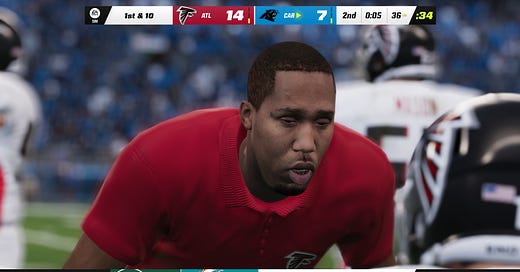







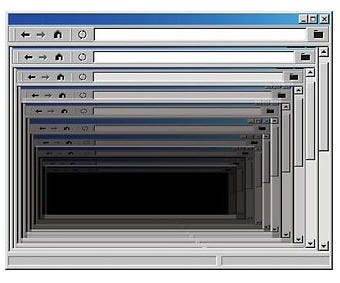

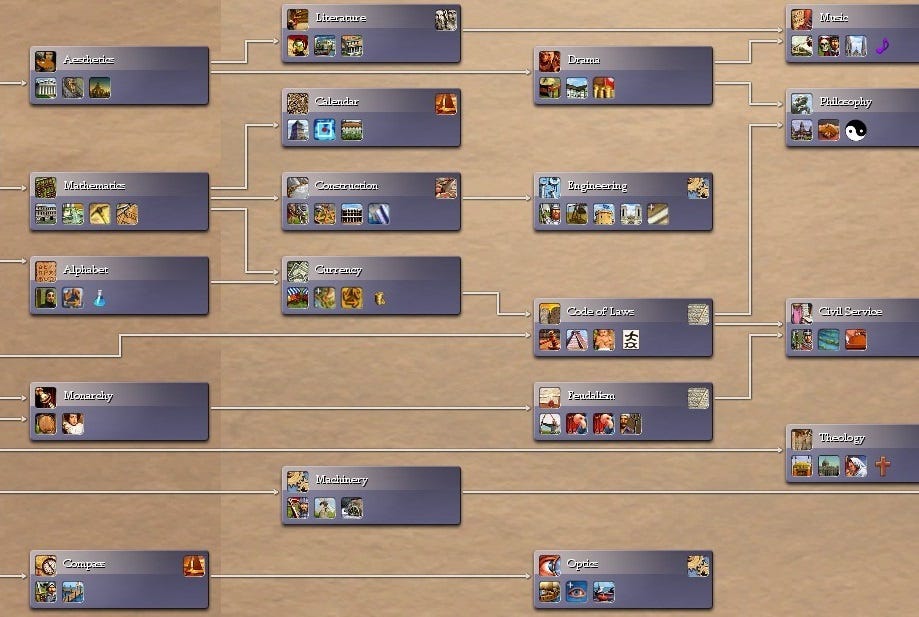

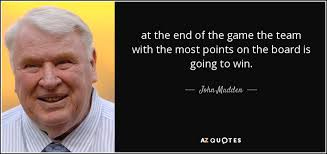




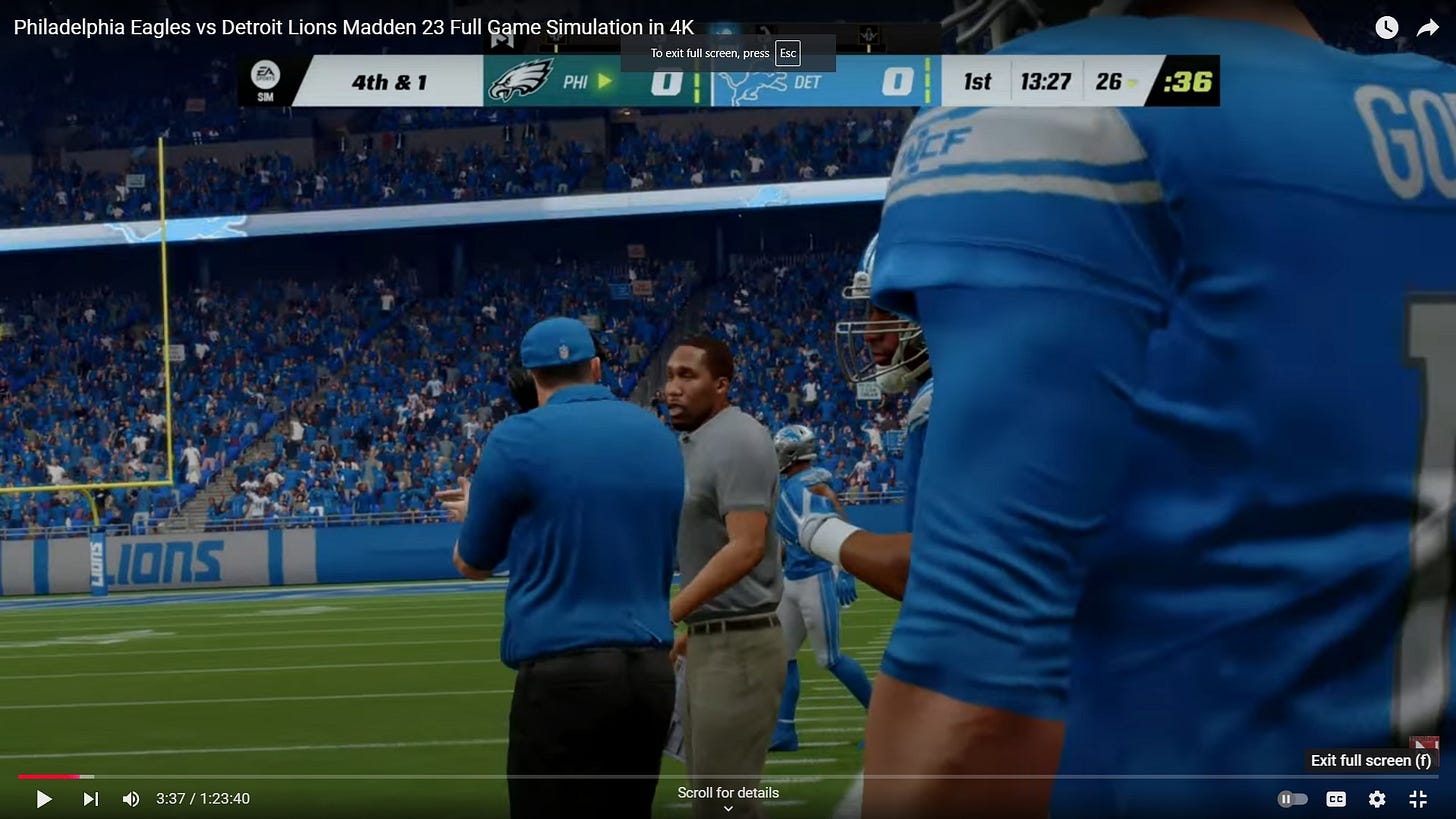



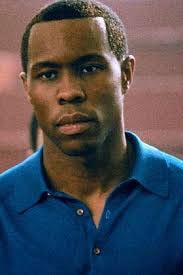
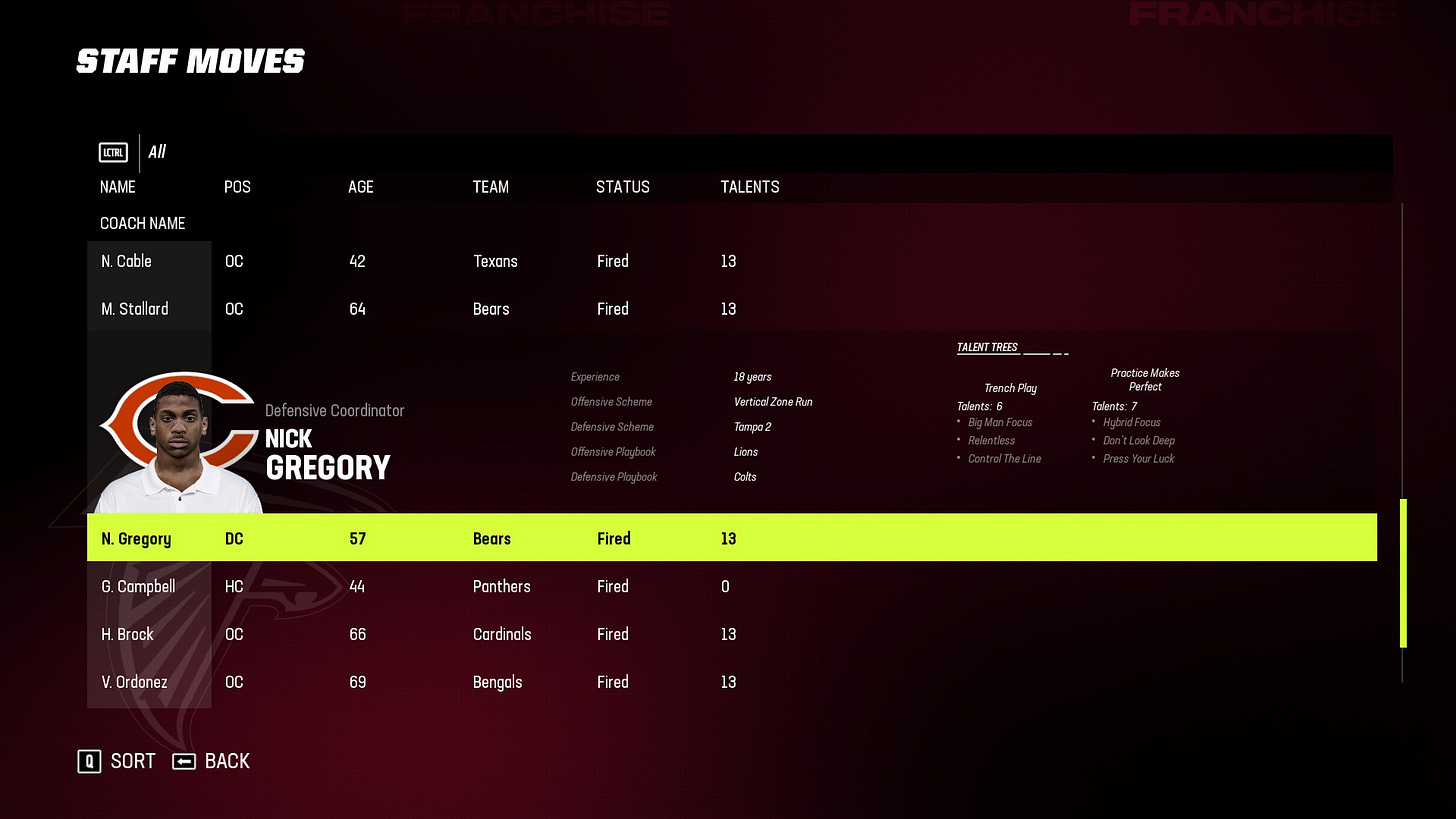


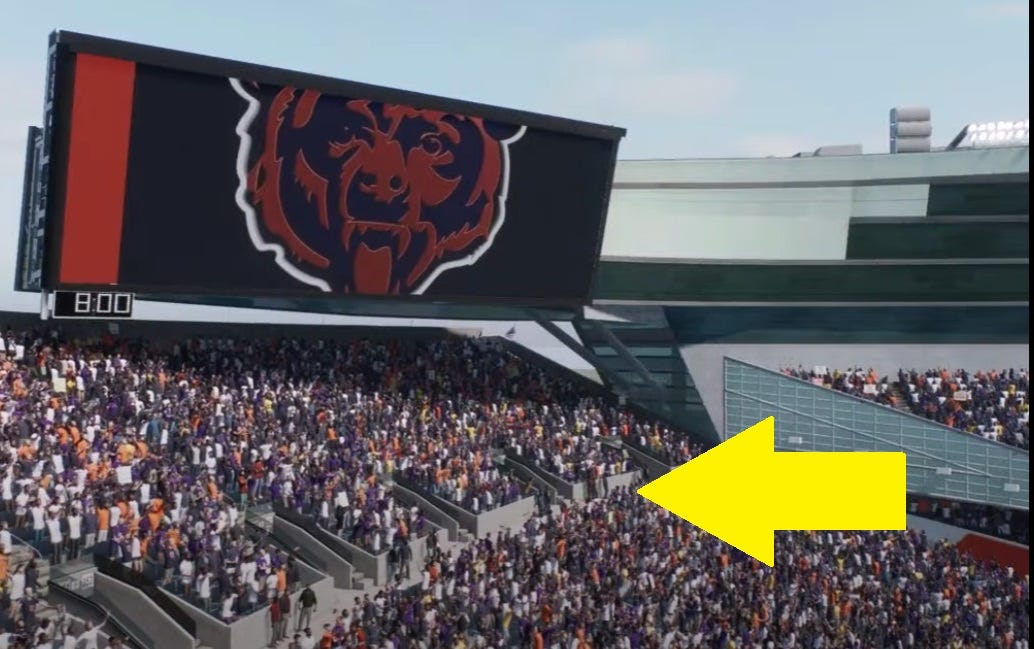
And in case you aren’t convinced, it now seems that there are good odds that a guy named Ben Johnson could the Bears next head coach. BEN! JOHNSON!
this is freaking brilliant!